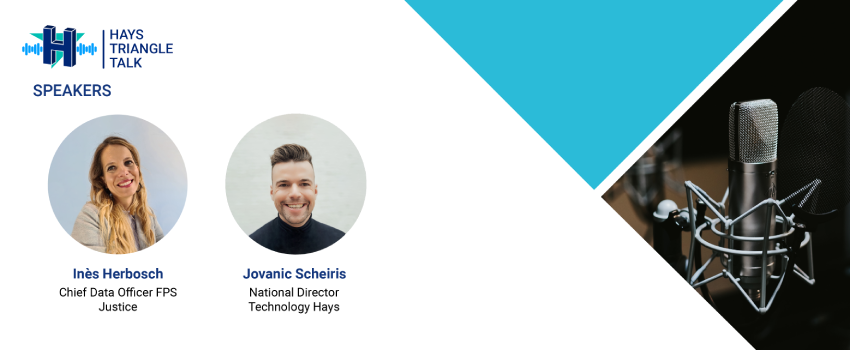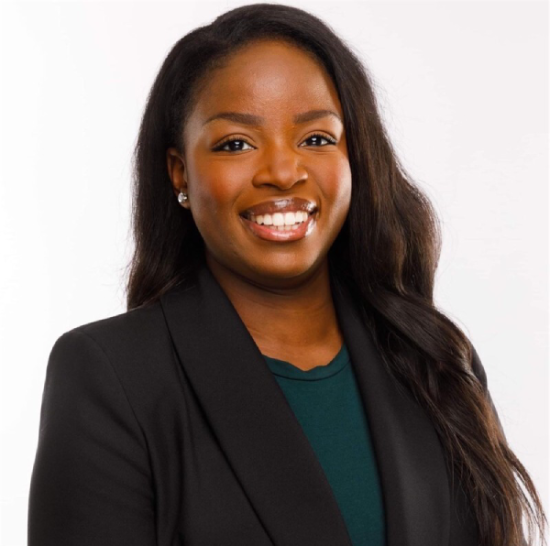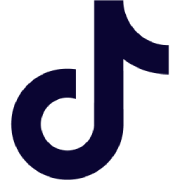Triangle Talk: Diversity in the technology sector

The technology sector: the whitest sector. To what extent can the sector call itself innovative and disruptive when it fails to meet even the most basic form of diversity, namely male-female ratio? Why does it need to look beyond just that form of diversity to reach out to all communities, whether they are people from immigrant backgrounds or young people from disadvantaged families? And how can they do it? What solutions are there to the barriers that have arisen in the past and that the technology sector still carries with it?
Diversity and inclusion are no easy topics and rarely have a one-size-fits-all answer. Nevertheless, we accept the challenge with our guests Inès Herbosch, Chief Data Officer at the FPS Justice, and Jovanic Scheiris, National Director of Technology at Hays. Read the highlights and most remarkable quotes from this enriching conversation between two technology specialists.
"Make the power of diversity more visible"
"There is still a huge amount of work when it comes to diversity in the tech industry. It also has to do with inclusion" says Jovanic when asked about what the situation is with diversity in the tech world. "You can be open to diverse profiles as a company, but they also truly need to be part of the company, so be inclusive as well," he adds. Inès agrees and says she sees an increasing trend of diversity in terms of background and age. " There's tremendous value in having diversity in a company, but you have to make room for this," she explains.
"Diversity is the solution to new problems."
Diversity has an enormous impact on several levels. "It gives insights that allow us to solve new problems in different ways. By involving diverse profiles, you start thinking more broadly" clarifies Inès.
"I'm the example that you can get somewhere even without a certain degree."
Different cultures have several types of knowledge and training from which we can learn a lot. "Within Belgium, the educational offer is also highly adapted. That's why it's time to move away from the typical requirements in the technology sector. There are people without a degree who have tremendous knowledge, maturity and insight," according to Inès. She explains that she herself has been a victim of this way of recruiting: "I am the example that you can get somewhere even without a particular degree." By putting different profiles together such as people without a specific degree, people with very typical degrees in STEM and Applied Economics, for example, and people from other cultures, you get the best results.
"Requirements like 'you need to be a unicorn' scare people off"
Inès feels like certain requirements in job postings put many people off, making them afraid to even take the first step to apply, "whereas I often think to myself 'you can do a lot more than what is required for this job'."
"We don't look at your CV, we assess your problem-solving ability."
There is a positive trend, according to Jovanic, in certain technology niches such as software development. "Here more and more hackathons are organized where they don't really look at the applicants' CVs but give the candidates a complicated problem. The one who can solve it gets hired. The focus here is more on skills than education," Jovanic explains.
"Hard skills are important, but common sense is more important."
Ms. Herbosch is convinced that many hard skills can be taught (easily): "You need to be interested in it though. There are many things you have to understand out of pure common sense and if you don't have that, it's very difficult to understand how data, travels end-to-end through applications, companies, society,..." With data, you deliver products and services to people, businesses, ... If you don't understand what the end goal is, it's hard to treat that data correctly.
"Being involved in their development is equally important."
An app you have mastered now can change completely within a year. Therefore, it is more important to invest in constant learning and not just focus on the skills a candidate has now. Jovanic recommends asking what the candidate wants to learn more about. Inès adds that you need to "assess their common sense. Look at what motivates them and whether they are really interested in the IT world." Are they really open to keep educating themselves?
"Give people a platform where it's okay to be different"
The great advantage of a diverse company is that you can use multiple people to teach each other new things internally, both soft and hard skills. "I myself have often collaborated with people from other cultures. For example, people from India have certain training and expertise that we don't have. If these people are on your team, you can ask them to give workshops about this," Inès advises. By bringing out each other's differences in a positive way, you also create a sense of recognition and inclusion.
"We are still in step one to more diversity"
"Many companies now know what diversity is. Everyone is bragging about it in their employer branding, especially to attract new colleagues. But when you really go into the companies, you see that it's necessary to move to step two: inclusive collaboration," Jovanic notes.
"Diversity is not just a criteria you can tick off on an inclusion list"
"I once experienced that a company was looking for a young person, with experience. Preferably it had to be a woman from a foreign country. I only met two criteria and this was enough to be hired. I was a 'check in the box' for them," recalls Inès from personal experience.
"Diversity is also financial”
We have never been forced to be truly diverse. "We have never had to look further than what we were used to and have had the 'luxury' of always being able to hire the same profiles. With technological evolution moving even faster, we may have a problem if we continue to rely only on those classic profiles." With the influx of international talent and knowledge, this is partly solved. The new STEM majors, aimed more at girls and children from poverty-stricken backgrounds, are also a step forward.
Jovanic adds that "if you want something to be aligned with society and only give men a say, you're not going to be able to use it in the real world. Thanks to the rapid evolutions in technology, we are forced to work more diversely if we want the technology we develop to actually be useful."
"Diversity is a gift."
Chief Data Officer Inès explains that "data can solve a lot because it generates so many insights. You can interpret each data point in a completely different way. Changing one parameter can make you look at a result differently again. With data you can also clearly demonstrate evolution and working points." She adds that "an advantage of diversity within the technology and the world of data is that you can have reports and analyses reviewed by different people. It's also a way to check how your data can be interpreted."
"Fear leads to prejudice."
Both tech experts conclude that the biggest barrier to more diversity is fear. "Fear among people already working in this sector and among the people who have to hire them leads to prejudice. The fear of taking that first step is very hindering. The solution: highlight more success stories," Jovanic said. "As a company, show that you are open to new things. Show what you have been able to accomplish successfully by using technology and diversity," Inès urges all companies.
If you enjoyed this recap, you can listen to the full episode here (in Dutch). Subscribe to Triangle Talk on Apple Podcasts, Google Podcasts and Spotify for more inspiring stories. Don’t forget to leave us a review!
Be sure to connect with us on LinkedIn, Instagram and Facebook, and if you know someone who you think would enjoy this episode, please share it with them on social media.
Benedicte Mbayi
Content Marketeer Hays Belgium






